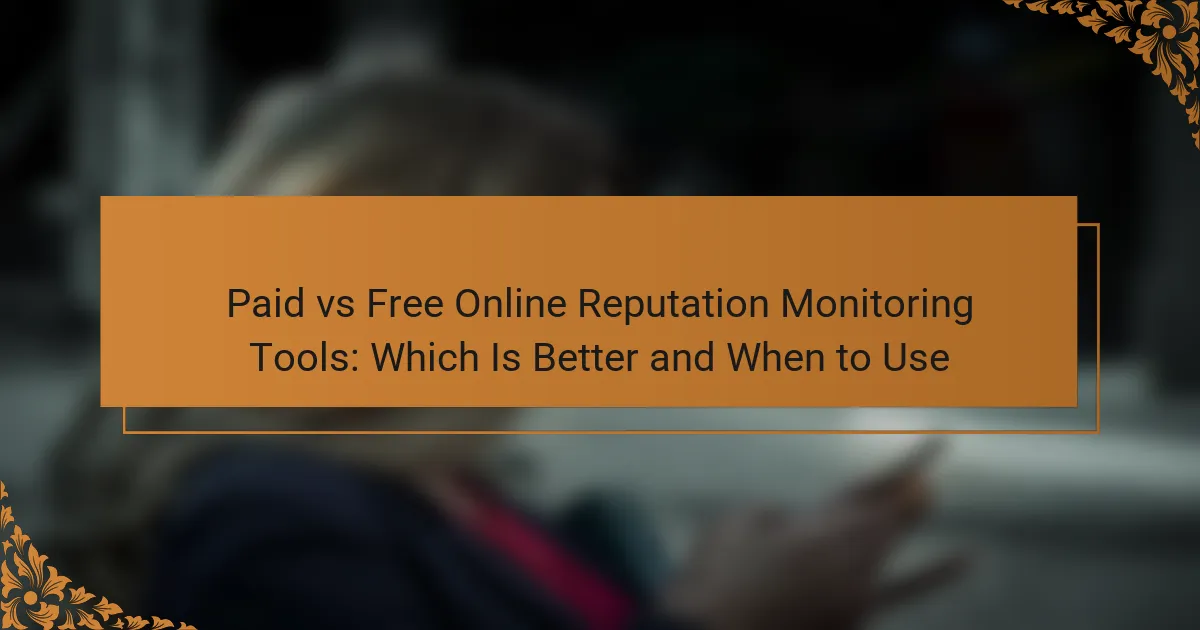In today’s digital landscape, monitoring your online reputation is crucial for both individuals and businesses. With a variety of paid and free tools available, it’s important to understand the strengths and limitations of each option. Paid tools often provide advanced features and comprehensive support, while free tools can serve as a cost-effective solution for basic monitoring needs.
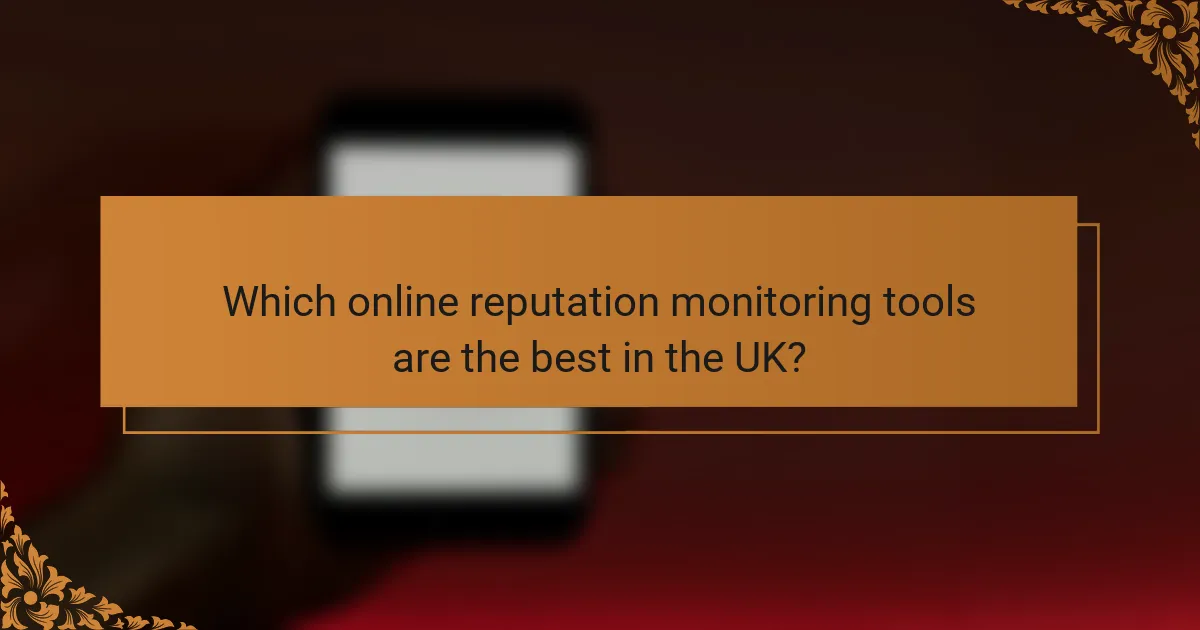
Which online reputation monitoring tools are the best in the UK?
The best online reputation monitoring tools in the UK include a mix of paid and free options that cater to different needs. These tools help individuals and businesses track their online presence, manage reviews, and respond to customer feedback effectively.
Brand24
Brand24 is a popular online reputation monitoring tool that offers real-time tracking of mentions across various platforms. It provides insights into brand sentiment and allows users to engage with customers directly through the platform.
Consider using Brand24 if you need comprehensive analytics and a user-friendly interface. It typically operates on a subscription model, with pricing tiers that cater to small businesses and larger enterprises alike.
Reputology
Reputology specializes in monitoring customer reviews across multiple review sites, making it ideal for businesses that rely heavily on customer feedback. It aggregates reviews from platforms like Google, Yelp, and TripAdvisor, providing a centralized dashboard for management.
This tool is particularly useful for businesses in the hospitality and service industries. Reputology offers various pricing plans, allowing users to choose based on their review volume and specific needs.
Google Alerts
Google Alerts is a free tool that sends notifications whenever your brand is mentioned online. While it lacks advanced features, it is a straightforward way to keep track of your online reputation without incurring any costs.
To set up Google Alerts, simply enter your brand name or relevant keywords, and you’ll receive email updates. This tool is best for individuals or small businesses looking for basic monitoring without the need for extensive analytics.
Hootsuite
Hootsuite is primarily a social media management tool, but it also offers reputation monitoring features. Users can track brand mentions and engage with followers across various social media platforms from a single dashboard.
Hootsuite is suitable for businesses that want to manage their social media presence while keeping an eye on their reputation. Pricing varies based on the number of social profiles and users, making it flexible for different business sizes.
Awario
Awario is a robust online reputation monitoring tool that provides real-time mentions tracking and sentiment analysis. It allows users to monitor not only social media but also blogs, forums, and news sites, making it comprehensive.
This tool is ideal for businesses looking for in-depth insights and analytics. Awario operates on a subscription basis, with plans that cater to startups and larger organizations, ensuring a good fit for various budgets.
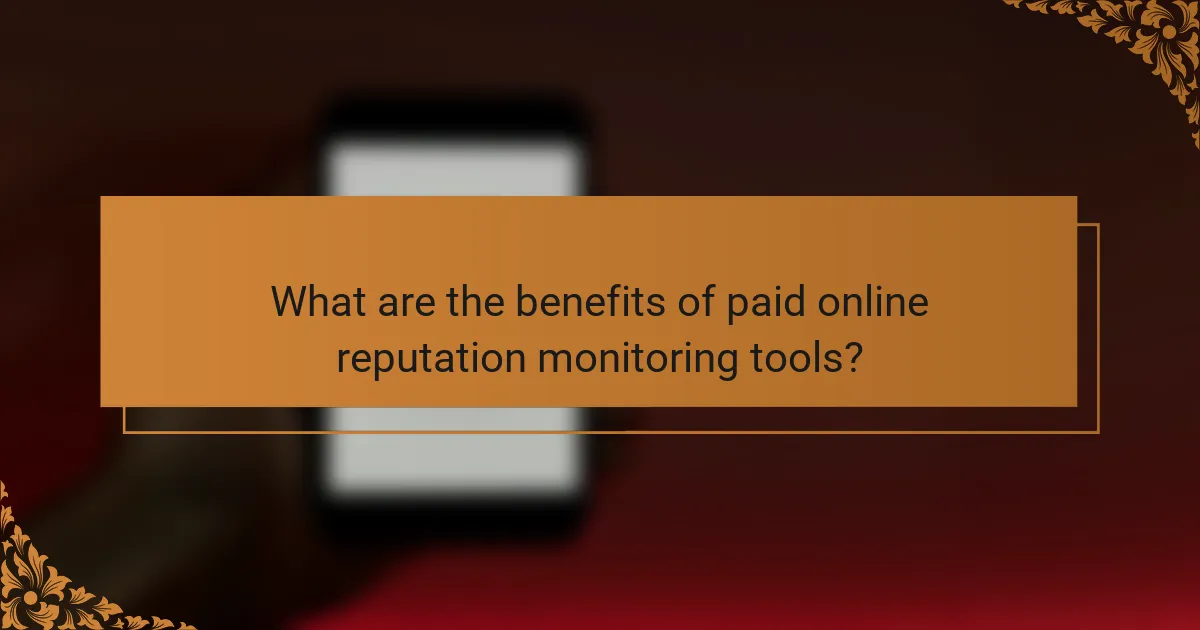
What are the benefits of paid online reputation monitoring tools?
Paid online reputation monitoring tools offer enhanced features and services that can significantly improve your ability to manage and protect your brand’s image. These tools typically provide advanced analytics, comprehensive coverage of various platforms, and dedicated customer support, making them a worthwhile investment for businesses serious about their online presence.
Advanced analytics features
Paid reputation monitoring tools often include advanced analytics that allow users to gain deeper insights into their online presence. Features such as sentiment analysis, trend tracking, and competitor benchmarking can help businesses understand how they are perceived in comparison to others in their industry.
For example, a tool might provide detailed reports on customer sentiment over time, highlighting shifts in public opinion that could impact your brand. This data can inform marketing strategies and help identify areas for improvement.
Comprehensive coverage
One of the key advantages of paid online reputation monitoring tools is their ability to provide comprehensive coverage across multiple platforms, including social media, review sites, and news outlets. This broad monitoring ensures that you are aware of all mentions of your brand, allowing for timely responses to any negative feedback.
Paid tools often track hundreds of sources, ensuring that no mention goes unnoticed. This level of coverage is crucial for businesses that operate in competitive markets where reputation can significantly influence customer decisions.
Customer support services
Paid tools typically come with dedicated customer support services, which can be invaluable for users who need assistance navigating the complexities of online reputation management. Access to knowledgeable support teams can help you troubleshoot issues, optimize tool usage, and implement best practices effectively.
For instance, many paid services offer personalized onboarding and training sessions, ensuring that users can maximize the tool’s capabilities from the start. This support can save time and enhance the overall effectiveness of your reputation management efforts.
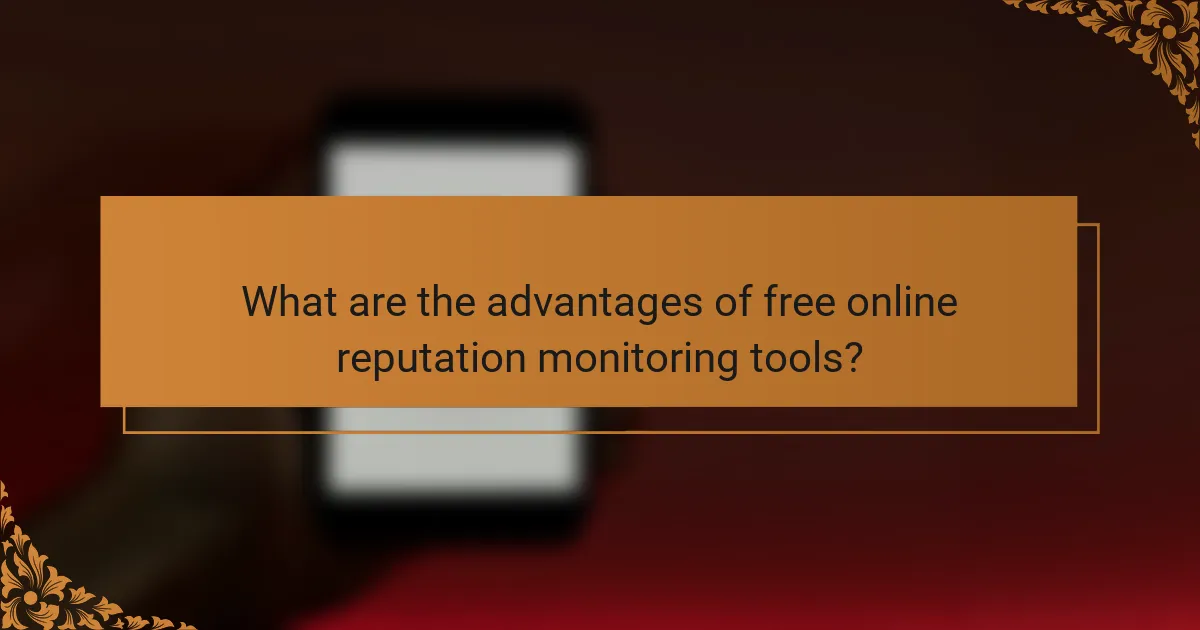
What are the advantages of free online reputation monitoring tools?
Free online reputation monitoring tools offer several benefits, including cost savings and basic functionality. They can help individuals and small businesses track their online presence without financial investment, making them accessible for those on a budget.
No financial commitment
The primary advantage of free online reputation monitoring tools is that they require no financial commitment. Users can access essential features without worrying about subscription fees or hidden costs. This is particularly beneficial for startups and freelancers who may have limited budgets.
By using free tools, users can allocate resources to other areas of their business while still maintaining an awareness of their online reputation. This can be a strategic advantage in competitive markets where every dollar counts.
Basic monitoring capabilities
Free tools typically offer basic monitoring capabilities, such as tracking mentions on social media and review sites. While these features may not be as comprehensive as paid options, they provide a solid foundation for understanding public perception. Users can receive alerts for new mentions, allowing them to respond promptly to feedback.
For individuals or small businesses, these basic features can be sufficient to manage their online reputation effectively. However, users should be aware that they may miss out on advanced analytics and deeper insights available in paid tools.
Easy to use
Free online reputation monitoring tools are generally designed to be user-friendly, making them accessible even for those with limited technical skills. Most platforms feature intuitive interfaces that guide users through the setup process and monitoring functions. This simplicity allows users to start tracking their reputation quickly.
Additionally, many free tools offer tutorials and support resources to help users maximize their effectiveness. However, it’s important to keep in mind that while ease of use is a significant advantage, the lack of advanced features may limit the depth of analysis available.

When should you choose paid tools over free tools?
Paid online reputation monitoring tools are preferable when businesses require comprehensive features, advanced analytics, and proactive management capabilities. These tools often provide better insights and support, making them ideal for organizations that prioritize their online presence.
For businesses with high online visibility
Companies with significant online visibility, such as those in competitive industries, benefit from paid tools that offer real-time monitoring and alerts. These tools can track mentions across various platforms, including social media, blogs, and news sites, ensuring that any negative feedback is addressed promptly.
For example, a retail brand may use a paid service to monitor customer reviews and social media mentions, allowing them to respond quickly to any issues that arise. This proactive approach helps maintain a positive brand image and customer trust.
When needing detailed reporting
Paid tools typically provide in-depth reporting features that free tools lack. Detailed analytics can help businesses understand trends, sentiment analysis, and the overall impact of their online reputation over time.
For instance, a company might use a paid tool to generate monthly reports that highlight key metrics, such as sentiment scores and engagement levels, enabling data-driven decisions. This level of insight is crucial for strategic planning and resource allocation.
For proactive reputation management
Paid reputation monitoring tools allow businesses to engage in proactive reputation management by offering features like sentiment tracking and competitor analysis. These capabilities help organizations identify potential issues before they escalate.
For example, a service may alert a business to a spike in negative mentions, allowing them to address customer concerns swiftly. This proactive stance not only mitigates damage but can also enhance customer loyalty and brand reputation over time.
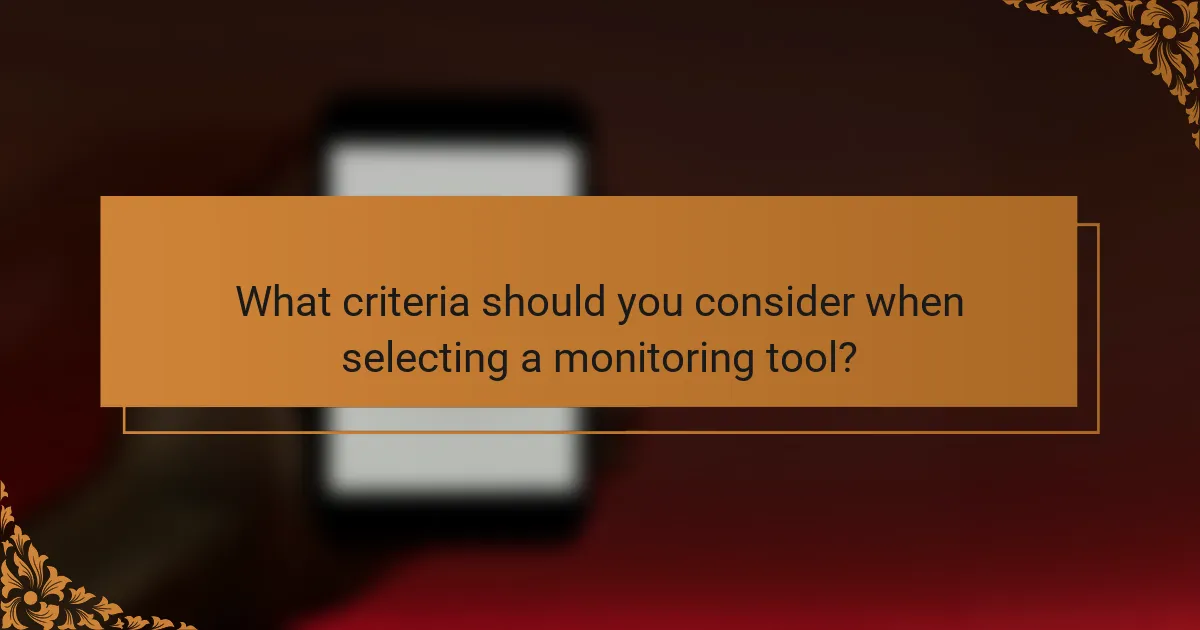
What criteria should you consider when selecting a monitoring tool?
When selecting a monitoring tool, consider factors such as your budget, specific monitoring needs, and the features offered by both free and paid options. Evaluating these criteria will help you choose a tool that aligns with your goals and resources.
Budget constraints
Your budget is a crucial factor in choosing an online reputation monitoring tool. Free tools may offer basic features, but they often lack advanced functionalities that paid tools provide. If your budget allows, investing in a paid tool can yield better insights and more comprehensive monitoring.
Consider setting a budget range based on your needs. For instance, tools priced between $20 to $100 per month typically offer enhanced features like sentiment analysis and competitor tracking. Weigh the cost against the potential benefits to determine what fits your financial plan.
Specific monitoring needs
Identifying your specific monitoring needs is essential for selecting the right tool. For example, if you require real-time alerts for brand mentions, a paid tool may be necessary, as free options often have delayed reporting. Assess whether you need features like social media tracking, review aggregation, or SEO insights.
Make a list of the key features that matter most to you. If you are a small business owner, you might prioritize customer reviews and social media mentions. In contrast, larger organizations may need comprehensive analytics and reporting capabilities. Tailoring your choice to your specific requirements will enhance the effectiveness of your monitoring efforts.
